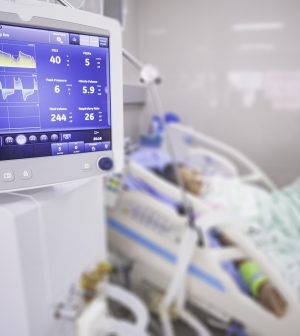- The Best Time of Day to Drink Bone Broth to Maximize Health Benefits
- 8 Ways to Increase Dopamine Naturally
- 7 Best Breads for Maintaining Stable Blood Sugar
- Gelatin vs. Collagen: Which is Best for Skin, Nails, and Joints?
- The Long-Term Effects of Daily Turmeric Supplements on Liver Health
- Could Your Grocery Store Meat Be Causing Recurring UTIs?
- Are You Making This Expensive Thermostat Error This Winter?
- Recognizing the Signs of Hypothyroidism
- 10 Strategies to Overcome Insomnia
- Could Artificial Sweeteners Be Aging the Brain Faster?
Even Without Symptoms, COVID Infection Raises Risks for Trauma Patients

Having COVID-19 could cause further trouble for patients being treated for physical trauma — even if they have no symptoms of the virus.
Researchers studying cases of trauma patients who tested positive for COVID-19 and those who were negative found those with the virus had significantly higher rates of heart attack and cardiac arrest. They also spent more days on a ventilator, in the intensive care unit and in the hospital overall. The cost of their care was much higher, too.
The findings were scheduled for presentation Sunday at the annual meeting of the American College of Surgeons, in San Diego.
“I found it shocking that just having the virus in the body could potentially cause more complications in trauma patients,” study co-author Dr. Lydia Lam said in a college news release. Lam is a general surgeon at Los Angeles County+USC Medical Center.
Not having symptoms of COVID-19 did not mean there were no health consequences, she explained.
For the study, Lam and her colleagues reviewed the COVID status of all trauma patients who were admitted to their urban Level 1 trauma center between March 2020 and October 2021. They zeroed in on patients who had tested positive for COVID-19, but had no COVID symptoms (“asymptomatic”).
The researchers then matched the 185 positive, asymptomatic patients with 554 COVID-negative patients who had similar type and severity of injury and other health issues. The investigators compared death rate, complications and use of hospital resources.
The COVID-positive, symptom-free patients fared far worse than their COVID-negative counterparts, the findings showed.
“This is one of the first studies to look at the impact of COVID in trauma patients with no clinical or radiological signs of infection, and we demonstrated higher incidence of cardiac events, longer length of stay and increased costs in positive trauma patients compared with a matched population of similar negative patients,” said lead author and research fellow Dr. Marco Sozzi.
“Simply put, you don’t have to have symptoms for the virus to potentially affect your body. Further studies will need to look at further indicators that may put patients at risk,” he said.
The study reinforces the need to screen all trauma patients for COVID so they can be isolated and not spread the virus to other patients, Sozzi noted
The study authors also suggested that trauma teams should more closely examine and monitor COVID-positive patients for complications.
According to the researchers, the COVID-positive patients had higher rates of heart attack and cardiac arrest (about 3% compared to less than 1%). Those with COVID-19 were on a ventilator for over three days versus 1.4 days. They spent almost five days in the intensive care unit compared to a little more than three days. Their hospital stays averaged 11 days versus seven days. And hospital charges for patients with COVID-19 were about $176,500 compared to just under $107,600.
The authors plan to study the reasons for these outcomes.
“We need more studies to understand the reason for this relationship between COVID-positive patients and the higher incidence of cardiac and other complications after a trauma,” Sozzi said.
Findings presented at medical meetings should be considered preliminary until published in a peer-reviewed journal.
More information
The U.S. Centers for Disease Control and Prevention has more on COVID-19.
SOURCE: American College of Surgeons, news release, Oct. 16, 2022
Source: HealthDay
Copyright © 2026 HealthDay. All rights reserved.










